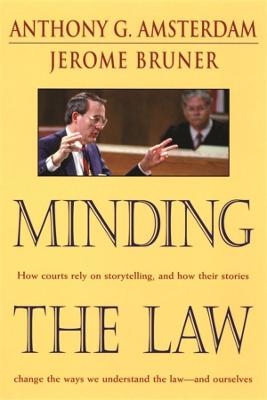
Minding the Law
Seiten
2002
Harvard University Press (Verlag)
978-0-674-00816-8 (ISBN)
Harvard University Press (Verlag)
978-0-674-00816-8 (ISBN)
One of the nation’s leading civil rights lawyers joins forces with one of the world’s foremost cultural psychologists to show how storytelling tactics and deeply rooted mythic structures shape the Supreme Court’s decisions about race, family law, and the death penalty.
In this remarkable collaboration, one of the nation's leading civil rights lawyers joins forces with one of the world's foremost cultural psychologists to put American constitutional law into an American cultural context. By close readings of key Supreme Court opinions, they show how storytelling tactics and deeply rooted mythic structures shape the Court's decisions about race, family law, and the death penalty.
Minding the Law explores crucial psychological processes involved in the work of lawyers and judges: deciding whether particular cases fit within a legal rule ("categorizing"), telling stories to justify one's claims or undercut those of an adversary ("narrative"), and tailoring one's language to be persuasive without appearing partisan ("rhetorics"). Because these processes are not unique to the law, courts' decisions cannot rest solely upon legal logic but must also depend vitally upon the underlying culture's storehouse of familiar tales of heroes and villains.
But a culture's stock of stories is not changeless.
Amsterdam and Bruner argue that culture itself is a dialectic constantly in progress, a conflict between the established canon and newly imagined "possible worlds." They illustrate the swings of this dialectic by a masterly analysis of the Supreme Court's race-discrimination decisions during the past century.
A passionate plea for heightened consciousness about the way law is practiced and made, Minding the Law will be welcomed by a new generation concerned with renewing law's commitment to a humane justice.
In this remarkable collaboration, one of the nation's leading civil rights lawyers joins forces with one of the world's foremost cultural psychologists to put American constitutional law into an American cultural context. By close readings of key Supreme Court opinions, they show how storytelling tactics and deeply rooted mythic structures shape the Court's decisions about race, family law, and the death penalty.
Minding the Law explores crucial psychological processes involved in the work of lawyers and judges: deciding whether particular cases fit within a legal rule ("categorizing"), telling stories to justify one's claims or undercut those of an adversary ("narrative"), and tailoring one's language to be persuasive without appearing partisan ("rhetorics"). Because these processes are not unique to the law, courts' decisions cannot rest solely upon legal logic but must also depend vitally upon the underlying culture's storehouse of familiar tales of heroes and villains.
But a culture's stock of stories is not changeless.
Amsterdam and Bruner argue that culture itself is a dialectic constantly in progress, a conflict between the established canon and newly imagined "possible worlds." They illustrate the swings of this dialectic by a masterly analysis of the Supreme Court's race-discrimination decisions during the past century.
A passionate plea for heightened consciousness about the way law is practiced and made, Minding the Law will be welcomed by a new generation concerned with renewing law's commitment to a humane justice.
Anthony G. Amsterdam is Judge Edward Weinfeld Professor of Law at New York University School of Law, and a MacArthur Fellow. Jerome Bruner was University Professor at New York University.
1. Invitation to a Journey 2. On Categories 3. Categorizing at the Supreme Court Missouri v. Jenkins and Michael H. v. Gerald D. 4. On Narrative 5. Narratives at Court Prigg v. Pennsylvania and Freeman v. Pitts 6. On Rhetorics 7. The Rhetorics of Death McCleskey v. Kemp 8. On the Dialectic of Culture 9. Race, the Court, and America's Dialectic From Plessy through Brown to Pitts and Jenkins 10. Reflections on a Voyage Appendix: Analysis of Nouns and Verbs in the Prigg, Pitts, and Brown Opinions Notes Table of Cases Index
| Erscheint lt. Verlag | 30.5.2002 |
|---|---|
| Verlagsort | Cambridge, Mass |
| Sprache | englisch |
| Maße | 156 x 235 mm |
| Gewicht | 640 g |
| Themenwelt | Recht / Steuern ► Allgemeines / Lexika |
| Recht / Steuern ► EU / Internationales Recht | |
| Recht / Steuern ► Öffentliches Recht | |
| ISBN-10 | 0-674-00816-2 / 0674008162 |
| ISBN-13 | 978-0-674-00816-8 / 9780674008168 |
| Zustand | Neuware |
| Haben Sie eine Frage zum Produkt? |
Mehr entdecken
aus dem Bereich
aus dem Bereich
Sammlung des Zivil-, Straf- und Verfahrensrechts, Rechtsstand: 14. …
Buch | Hardcover (2024)
C.H.Beck (Verlag)
49,00 €
Klausuren, Hausarbeiten, Seminare, Bachelor- und Masterarbeiten
Buch | Softcover (2021)
C.H.Beck (Verlag)
12,90 €


